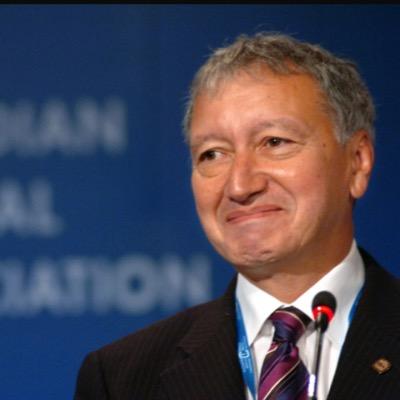
Dr. Brian Day
@DrBrianDay 
- Past President Canadian Medical Association
- Past President Arthroscopy Association of North America
- Honourary Associate Professor University of British Columbia
- 2014 Doctors of BC Don Rix Leadership Award


By Dr. Brian Day
I recall, years ago, listening to an interview of a physician turned politician and cabinet minister. The reporter asked how difficult the transition from medicine was. "Easy!" said the newly minted politician. "What do you mean?" asked the reporter. The new minister explained, "I have been involved for years in medical and university politics, where everyone involved is intelligent and articulate. Around the cabinet table such qualities are rare."
Recent local events in provincial medical politics illustrate the difficulty of getting involved in a conflict that involves doctors. It is probably easier to herd cats than unite doctors, especially when the issues are resources and money. Disputes between different specialties are sometimes matched by even stronger disagreements within the same section. Governments benefit when we succumb to the strategy of divide and rule.
The demand for physician services in Canada is increasing, and patients continue to suffer as they wait for access. The shortage of doctors is a fact. Oddly, despite the recent increase in graduates from medical schools, new doctors often find it difficult to get a job. I have seen form letters sent to referring doctors by orthopaedic surgeons that (apologetically) offer consultation appointments in 2, 3, and even 4 years. Yet newly trained orthopaedic graduates can't get a job, except as a locum.
I am certain that these young doctors had not anticipated spending 13 years or more in postsecondary training in order to practise as holiday relief workers. The suggestion that we solve this dilemma by cutting back on the number of orthopaedic surgeons we train proves that economic laws of supply and demand play little part in our health system. Political interference in the process is to blame for this "irrational rationing."
Politicians tend to operate in electoral cycles of up to 4 years. As physicians, we should understand that this is not just a political, but also a human frailty.
A good example was illustrated recently by a 27-year-old hockey-playing patient of mine. He came for a follow-up, having undergone a knee ligament reconstruction 4 months previously. I told him his knee felt stable, and that he could start to increase his activity level and return to more vigorous skating, including quick turns. He proudly announced that he had stopped smoking.
Prior to his surgery, I had warned him that smoking interfered with ligament healing. This struck a chord with him. He had smoked for more than half of his life and the knowledge that smoking might, in the long term, result in death from cancer or heart disease had not deterred him. The potential impact of a failed knee ligament surgery preventing a return to hockey in 6 months was a direct short-term threat that resonated with him.
Physicians deal with the long-term health outcomes of their patients and, if they enter the field of politics, may be more likely to appreciate the importance of long-term planning. They might also understand the need to downsize the bureaucracy, especially as it applies to health.
Our 14 Canadian ministries of health (each with ministers, deputy ministers, associate deputies, assistant deputies, etc.) have created a large tax-funded support group. In Canada there is one government health care bureaucrat for every 1400 Canadians, versus 1 per 15000 in Germany. Reduced funding for patient care is a direct consequence of this reality.
I recently asked a high ranking hospital executive what the impact would be if the Ministry of Health were eliminated and the Ministry of Finance simply supplied funding to the health authorities directly. "More money for patient care," was the immediate answer.
Tommy Douglas called for our health system to be administered by a commission, "...free from political interference." He mandated that the chair "shall be a physician," and that "...the professional committees shall have unrestricted jurisdiction over all scientific, technical, and professional matters." Those modern-day supporters of Tommy Douglas should reflect on his belief that political meddling and interference in our health system was unhealthy.
In 1896, Sir Charles Tupper (the CMA's first president) became the first and last doctor to become prime minister of Canada. He was voted out of office shortly afterwards, distinguishing himself as the shortest reigning prime minister in our history. Colleagues with the passion, personality, skills, and interest to stand for provincial or federal political office should be identified, supported, and elected—and one day we may even have our second physician prime minister. Physician politicians may provide the solutions to the impasse that currently blocks the necessary transformation of our health system.
—BD